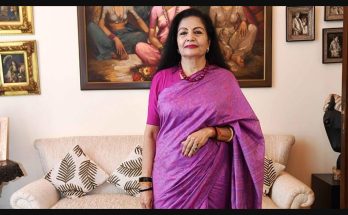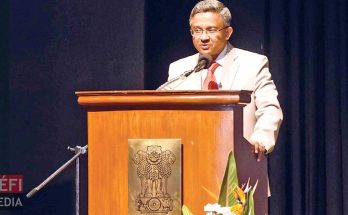 Underlining India’s development-centric foreign policy, Prime Minister Manmohan Singh has enunciated the five core principles that animate the country’s engagement with an increasingly globalised world, which include prioritising the economic aspirations of the over 1.2 billion Indians.
Underlining India’s development-centric foreign policy, Prime Minister Manmohan Singh has enunciated the five core principles that animate the country’s engagement with an increasingly globalised world, which include prioritising the economic aspirations of the over 1.2 billion Indians.
Steering clear of grandiloquence, India’s prime minister has unveiled a pragmatic vision of the country’s foreign policy that seeks to blend the economic imperative of unleashing prosperity without compromising on core values of democracy, pluralism and secularism.
The occasion he chose to expound his views on India’s foreign policy, which he has helped shape for the last nine years as the prime minister, was apt: he was speaking to over 120 heads of Indian missions who have gathered in the Indian capital for a four-day conclave.
The annual diplomats’ gathering, which is themed “India’s Place in Changing World Order: Where Do We See Ourselves? What Do We Wish to Achieve?,” is an exercise in introspection and stock-taking to map the way forward for promoting India’s key foreign policy interest across regions and in preeminent global bodies.
Economic diplomacy is top of the agenda, which is linked with attendant issues of inclusive growth and development.
“The great leaders of our freedom struggle instinctively saw the intrinsic link between our foreign policy and the economic aspirations of our people. A free India had to be also a prosperous India,” Manmohan Singh told Indian envoys in New Delhi November 4.
“This has been the central vision of our foreign policy and must continue to remain so. Therefore, the foreign policy we pursue must reflect our national priorities and concerns and be in concert with our capabilities,” he stressed.
Manmohan Mantra: Five Principles
 Manmohan Singh outlined what he called the five principles that define India’s foreign policy and exhorted the Indian envoys to ensure that they are guided by these principles in discharging their diplomatic duty.
Manmohan Singh outlined what he called the five principles that define India’s foreign policy and exhorted the Indian envoys to ensure that they are guided by these principles in discharging their diplomatic duty.
“First, recognition that India’s relations with the world – both major powers and our Asian neighbours – are increasingly shaped by our developmental priorities. The single most important objective of Indian foreign policy has to be to create a global environment conducive to the well-being of our great country.”
“Second, that greater integration with the world economy will benefit India and enable our people to realize their creative potential.”
“Third, we seek stable, long term and mutually beneficial relations with all major powers. We are prepared to work with the international community to create a global economic and security environment beneficial to all nations.”
“Fourth, we recognize that the Indian sub-continent’s shared destiny requires greater regional cooperation and connectivity. Towards this end, we must strengthen regional institutional capability and capacity and invest in connectivity.”
“Fifth, our foreign policy is not defined merely by our interests, but also by the values which are very dear to our people.”
He lauded the Indian model of foreign policy, which is underpinned by strategic autonomy, non-alignment and the resolution of issues through diplomacy, for pursuing economic liberation of the country within the framework of time-tested principles of liberalism and democracy. “India’s experiment of pursuing economic development within the framework of a plural, secular and liberal democracy has inspired people around the world and should continue to do so,” said the prime minister.
Manmohan Singh underscored that the UPA government has “sought to engineer a fundamental reset” in India’s foreign policy, based on national priorities and the country’s role and destiny in world affairs.
Praise for foreign office
The prime minister was all praise for India’s external affairs ministry for adapting “well to its changing environment and emerging responsibilities” and the country’s diplomats for promoting the country’s interests amid trying circumstances
“This is a time of immense flux in the world and you work in an environment of expanding responsibilities, rising expectations and relentless public scrutiny. That you do this with modest resources and often in difficult and dangerous circumstances is to your great credit,” he said.
India has one of the smallest foreign office for an emerging economy of over 1.2 billion people. Critics say with around 800 diplomats, India’s foreign office is woefully small in size, given India’s rising power and its aspirations for a UN Security Council permanent seat. Compared to that, Brazil, a fellow BRICS country, has a 3,000-strong diplomatic staff, China has 6,200 diplomats and the US tops the list with 19,667 diplomats. The ministry has taken a slew of steps to expand India’s foreign office to meet growing demands made on the county to play an increasingly proactive role in a host of multilateral fora.
But despite a relatively small number of diplomats and limited resources, India’s external affairs ministry has rapidly expanded the country’s diplomatic and economic footprints across the world. The last decade has witnessed major diplomatic triumphs for the country: the sealing of a path-breaking India-US nuclear deal which paved the way for the country’s global nuclear rapprochement, an eventful tenure as a non-permanent member of the UN Security Council (2010-2012), the sealing of FTA with the 10-nation ASEAN and at least half a dozen countries, are just some of the achievements that have raised India’s global stature and has made the country a key player in shaping global debates on a gamut of cross-cutting issues.
Author Profile
- India Writes Network (www.indiawrites.org) is an emerging think tank and a media-publishing company focused on international affairs & the India Story. Centre for Global India Insights is the research arm of India Writes Network. To subscribe to India and the World, write to editor@indiawrites.org. A venture of TGII Media Private Limited, a leading media, publishing and consultancy company, IWN has carved a niche for balanced and exhaustive reporting and analysis of international affairs. Eminent personalities, politicians, diplomats, authors, strategy gurus and news-makers have contributed to India Writes Network, as also “India and the World,” a magazine focused on global affairs.
Latest entries
 DiplomacyApril 10, 2024Diplomat-author Lakshmi Puri pitches for women power at LSR
DiplomacyApril 10, 2024Diplomat-author Lakshmi Puri pitches for women power at LSR India and the WorldApril 6, 2024UN envoy pitches to take India’s solutions to the world stage
India and the WorldApril 6, 2024UN envoy pitches to take India’s solutions to the world stage CultureApril 5, 2024Youth in Diplomacy: Making it Matter with LSR Model UN 2024
CultureApril 5, 2024Youth in Diplomacy: Making it Matter with LSR Model UN 2024 India and the WorldMarch 28, 2024India to China: Normalization of troops deployment imperative for restoring ties
India and the WorldMarch 28, 2024India to China: Normalization of troops deployment imperative for restoring ties







